Law Policy and Ethical Practice in Health and Social Care
VerifiedAdded on 2023/01/19
|12
|4127
|77
AI Summary
This document discusses the role of legislature, executive, and judiciary in the UK system and their impact on health and social care provision. It also explores the influence of relevant legislation, ethical codes, and national and organizational policies on practices within the field. The document focuses on the National Health Service (NHS) and highlights key legislations such as the Equality Act 2010, Human Rights Act 1998, and Mental Capacity Act 2005.
Contribute Materials
Your contribution can guide someone’s learning journey. Share your
documents today.
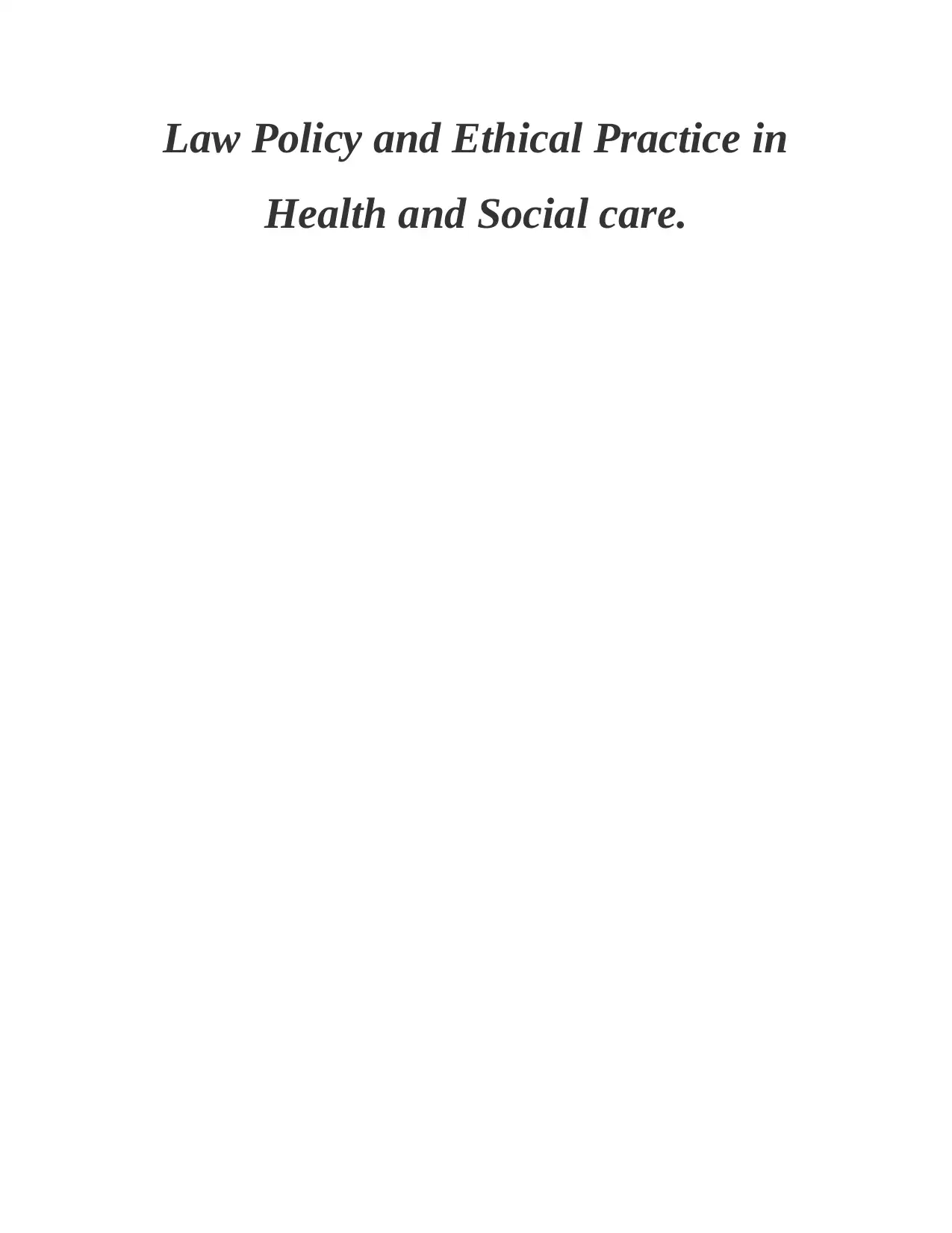
Law Policy and Ethical Practice in
Health and Social care.
Health and Social care.
Secure Best Marks with AI Grader
Need help grading? Try our AI Grader for instant feedback on your assignments.
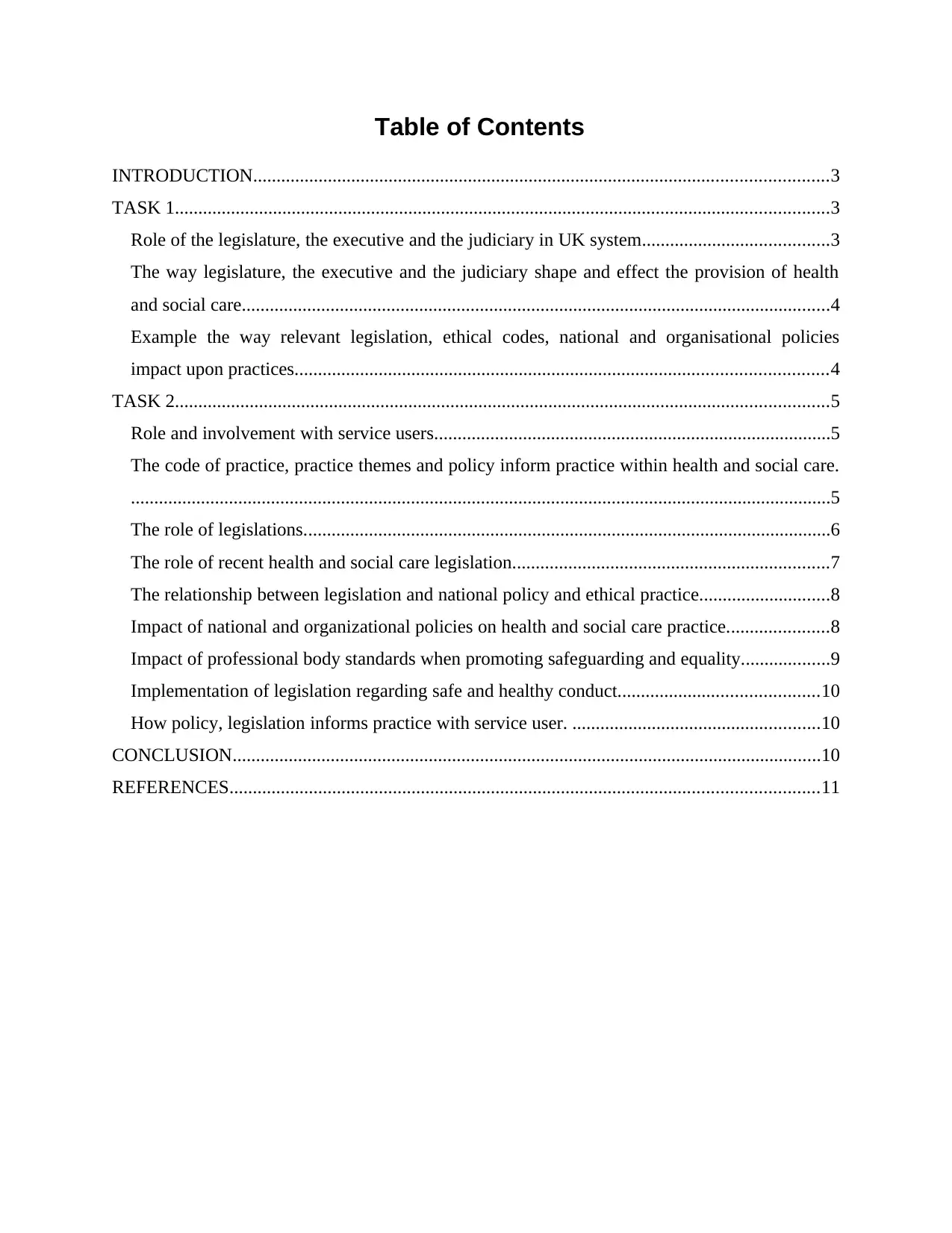
Table of Contents
INTRODUCTION...........................................................................................................................3
TASK 1............................................................................................................................................3
Role of the legislature, the executive and the judiciary in UK system........................................3
The way legislature, the executive and the judiciary shape and effect the provision of health
and social care..............................................................................................................................4
Example the way relevant legislation, ethical codes, national and organisational policies
impact upon practices..................................................................................................................4
TASK 2............................................................................................................................................5
Role and involvement with service users.....................................................................................5
The code of practice, practice themes and policy inform practice within health and social care.
......................................................................................................................................................5
The role of legislations.................................................................................................................6
The role of recent health and social care legislation....................................................................7
The relationship between legislation and national policy and ethical practice............................8
Impact of national and organizational policies on health and social care practice......................8
Impact of professional body standards when promoting safeguarding and equality...................9
Implementation of legislation regarding safe and healthy conduct...........................................10
How policy, legislation informs practice with service user. .....................................................10
CONCLUSION..............................................................................................................................10
REFERENCES..............................................................................................................................11
INTRODUCTION...........................................................................................................................3
TASK 1............................................................................................................................................3
Role of the legislature, the executive and the judiciary in UK system........................................3
The way legislature, the executive and the judiciary shape and effect the provision of health
and social care..............................................................................................................................4
Example the way relevant legislation, ethical codes, national and organisational policies
impact upon practices..................................................................................................................4
TASK 2............................................................................................................................................5
Role and involvement with service users.....................................................................................5
The code of practice, practice themes and policy inform practice within health and social care.
......................................................................................................................................................5
The role of legislations.................................................................................................................6
The role of recent health and social care legislation....................................................................7
The relationship between legislation and national policy and ethical practice............................8
Impact of national and organizational policies on health and social care practice......................8
Impact of professional body standards when promoting safeguarding and equality...................9
Implementation of legislation regarding safe and healthy conduct...........................................10
How policy, legislation informs practice with service user. .....................................................10
CONCLUSION..............................................................................................................................10
REFERENCES..............................................................................................................................11
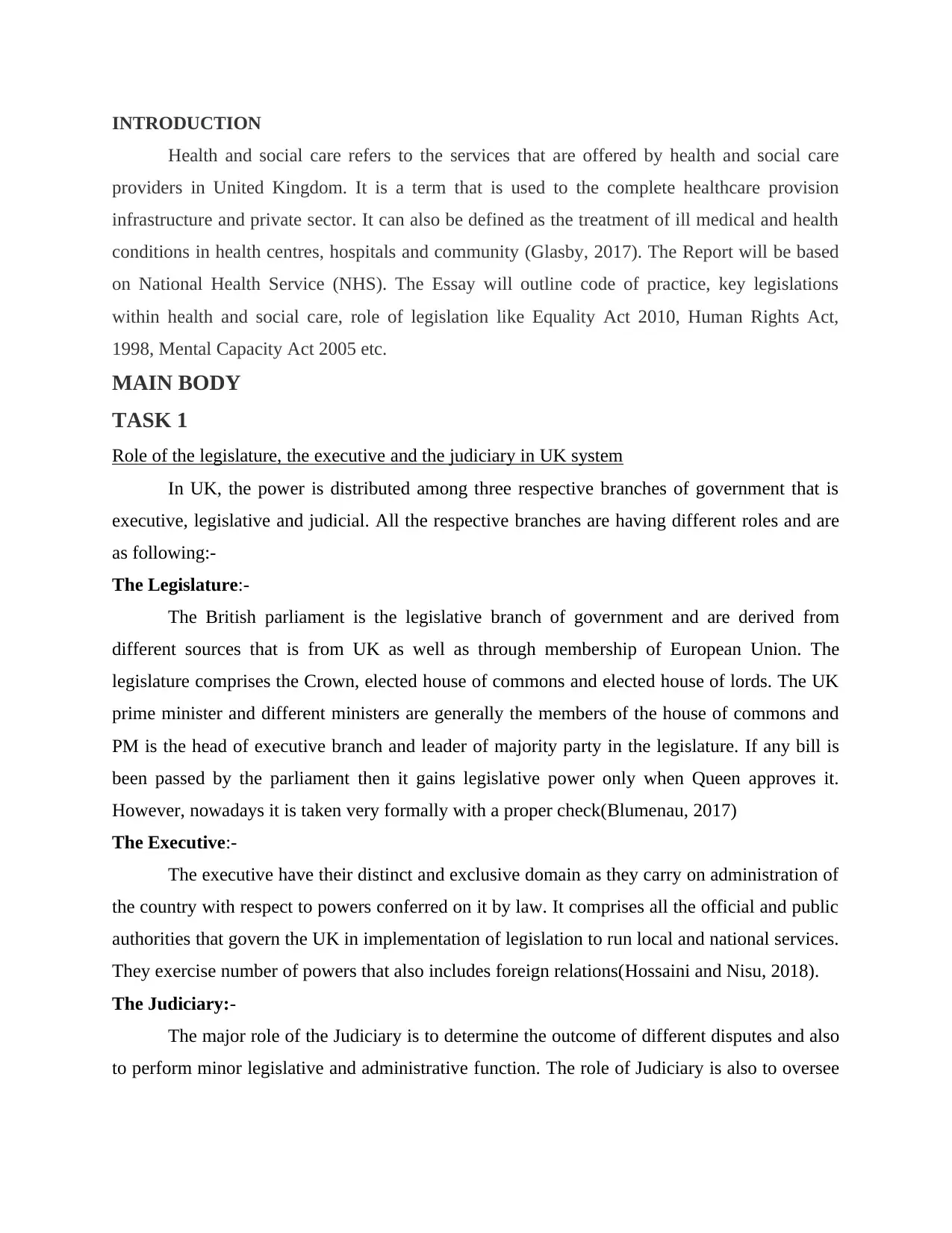
INTRODUCTION
Health and social care refers to the services that are offered by health and social care
providers in United Kingdom. It is a term that is used to the complete healthcare provision
infrastructure and private sector. It can also be defined as the treatment of ill medical and health
conditions in health centres, hospitals and community (Glasby, 2017). The Report will be based
on National Health Service (NHS). The Essay will outline code of practice, key legislations
within health and social care, role of legislation like Equality Act 2010, Human Rights Act,
1998, Mental Capacity Act 2005 etc.
MAIN BODY
TASK 1
Role of the legislature, the executive and the judiciary in UK system
In UK, the power is distributed among three respective branches of government that is
executive, legislative and judicial. All the respective branches are having different roles and are
as following:-
The Legislature:-
The British parliament is the legislative branch of government and are derived from
different sources that is from UK as well as through membership of European Union. The
legislature comprises the Crown, elected house of commons and elected house of lords. The UK
prime minister and different ministers are generally the members of the house of commons and
PM is the head of executive branch and leader of majority party in the legislature. If any bill is
been passed by the parliament then it gains legislative power only when Queen approves it.
However, nowadays it is taken very formally with a proper check(Blumenau, 2017)
The Executive:-
The executive have their distinct and exclusive domain as they carry on administration of
the country with respect to powers conferred on it by law. It comprises all the official and public
authorities that govern the UK in implementation of legislation to run local and national services.
They exercise number of powers that also includes foreign relations(Hossaini and Nisu, 2018).
The Judiciary:-
The major role of the Judiciary is to determine the outcome of different disputes and also
to perform minor legislative and administrative function. The role of Judiciary is also to oversee
Health and social care refers to the services that are offered by health and social care
providers in United Kingdom. It is a term that is used to the complete healthcare provision
infrastructure and private sector. It can also be defined as the treatment of ill medical and health
conditions in health centres, hospitals and community (Glasby, 2017). The Report will be based
on National Health Service (NHS). The Essay will outline code of practice, key legislations
within health and social care, role of legislation like Equality Act 2010, Human Rights Act,
1998, Mental Capacity Act 2005 etc.
MAIN BODY
TASK 1
Role of the legislature, the executive and the judiciary in UK system
In UK, the power is distributed among three respective branches of government that is
executive, legislative and judicial. All the respective branches are having different roles and are
as following:-
The Legislature:-
The British parliament is the legislative branch of government and are derived from
different sources that is from UK as well as through membership of European Union. The
legislature comprises the Crown, elected house of commons and elected house of lords. The UK
prime minister and different ministers are generally the members of the house of commons and
PM is the head of executive branch and leader of majority party in the legislature. If any bill is
been passed by the parliament then it gains legislative power only when Queen approves it.
However, nowadays it is taken very formally with a proper check(Blumenau, 2017)
The Executive:-
The executive have their distinct and exclusive domain as they carry on administration of
the country with respect to powers conferred on it by law. It comprises all the official and public
authorities that govern the UK in implementation of legislation to run local and national services.
They exercise number of powers that also includes foreign relations(Hossaini and Nisu, 2018).
The Judiciary:-
The major role of the Judiciary is to determine the outcome of different disputes and also
to perform minor legislative and administrative function. The role of Judiciary is also to oversee
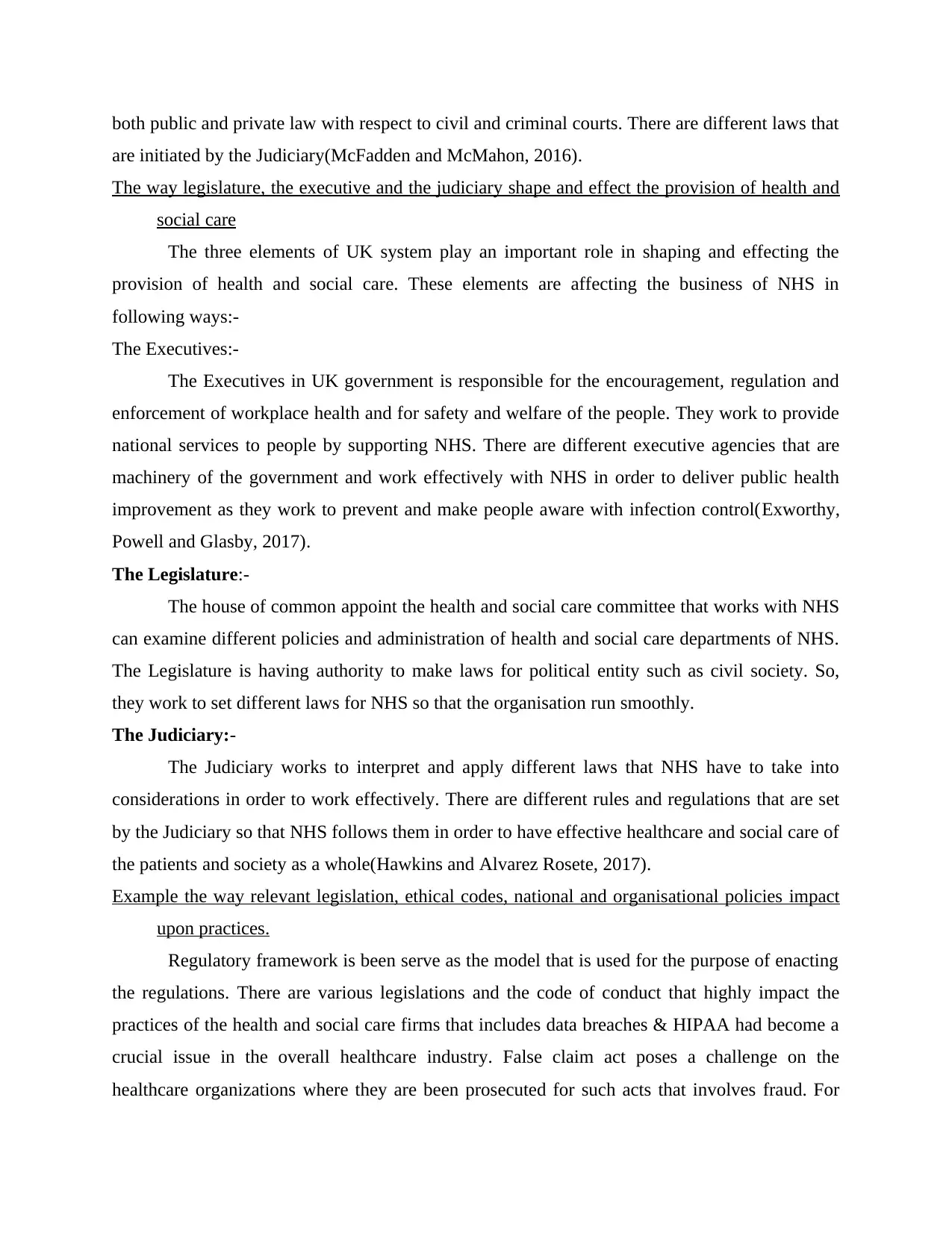
both public and private law with respect to civil and criminal courts. There are different laws that
are initiated by the Judiciary(McFadden and McMahon, 2016).
The way legislature, the executive and the judiciary shape and effect the provision of health and
social care
The three elements of UK system play an important role in shaping and effecting the
provision of health and social care. These elements are affecting the business of NHS in
following ways:-
The Executives:-
The Executives in UK government is responsible for the encouragement, regulation and
enforcement of workplace health and for safety and welfare of the people. They work to provide
national services to people by supporting NHS. There are different executive agencies that are
machinery of the government and work effectively with NHS in order to deliver public health
improvement as they work to prevent and make people aware with infection control(Exworthy,
Powell and Glasby, 2017).
The Legislature:-
The house of common appoint the health and social care committee that works with NHS
can examine different policies and administration of health and social care departments of NHS.
The Legislature is having authority to make laws for political entity such as civil society. So,
they work to set different laws for NHS so that the organisation run smoothly.
The Judiciary:-
The Judiciary works to interpret and apply different laws that NHS have to take into
considerations in order to work effectively. There are different rules and regulations that are set
by the Judiciary so that NHS follows them in order to have effective healthcare and social care of
the patients and society as a whole(Hawkins and Alvarez Rosete, 2017).
Example the way relevant legislation, ethical codes, national and organisational policies impact
upon practices.
Regulatory framework is been serve as the model that is used for the purpose of enacting
the regulations. There are various legislations and the code of conduct that highly impact the
practices of the health and social care firms that includes data breaches & HIPAA had become a
crucial issue in the overall healthcare industry. False claim act poses a challenge on the
healthcare organizations where they are been prosecuted for such acts that involves fraud. For
are initiated by the Judiciary(McFadden and McMahon, 2016).
The way legislature, the executive and the judiciary shape and effect the provision of health and
social care
The three elements of UK system play an important role in shaping and effecting the
provision of health and social care. These elements are affecting the business of NHS in
following ways:-
The Executives:-
The Executives in UK government is responsible for the encouragement, regulation and
enforcement of workplace health and for safety and welfare of the people. They work to provide
national services to people by supporting NHS. There are different executive agencies that are
machinery of the government and work effectively with NHS in order to deliver public health
improvement as they work to prevent and make people aware with infection control(Exworthy,
Powell and Glasby, 2017).
The Legislature:-
The house of common appoint the health and social care committee that works with NHS
can examine different policies and administration of health and social care departments of NHS.
The Legislature is having authority to make laws for political entity such as civil society. So,
they work to set different laws for NHS so that the organisation run smoothly.
The Judiciary:-
The Judiciary works to interpret and apply different laws that NHS have to take into
considerations in order to work effectively. There are different rules and regulations that are set
by the Judiciary so that NHS follows them in order to have effective healthcare and social care of
the patients and society as a whole(Hawkins and Alvarez Rosete, 2017).
Example the way relevant legislation, ethical codes, national and organisational policies impact
upon practices.
Regulatory framework is been serve as the model that is used for the purpose of enacting
the regulations. There are various legislations and the code of conduct that highly impact the
practices of the health and social care firms that includes data breaches & HIPAA had become a
crucial issue in the overall healthcare industry. False claim act poses a challenge on the
healthcare organizations where they are been prosecuted for such acts that involves fraud. For
Secure Best Marks with AI Grader
Need help grading? Try our AI Grader for instant feedback on your assignments.
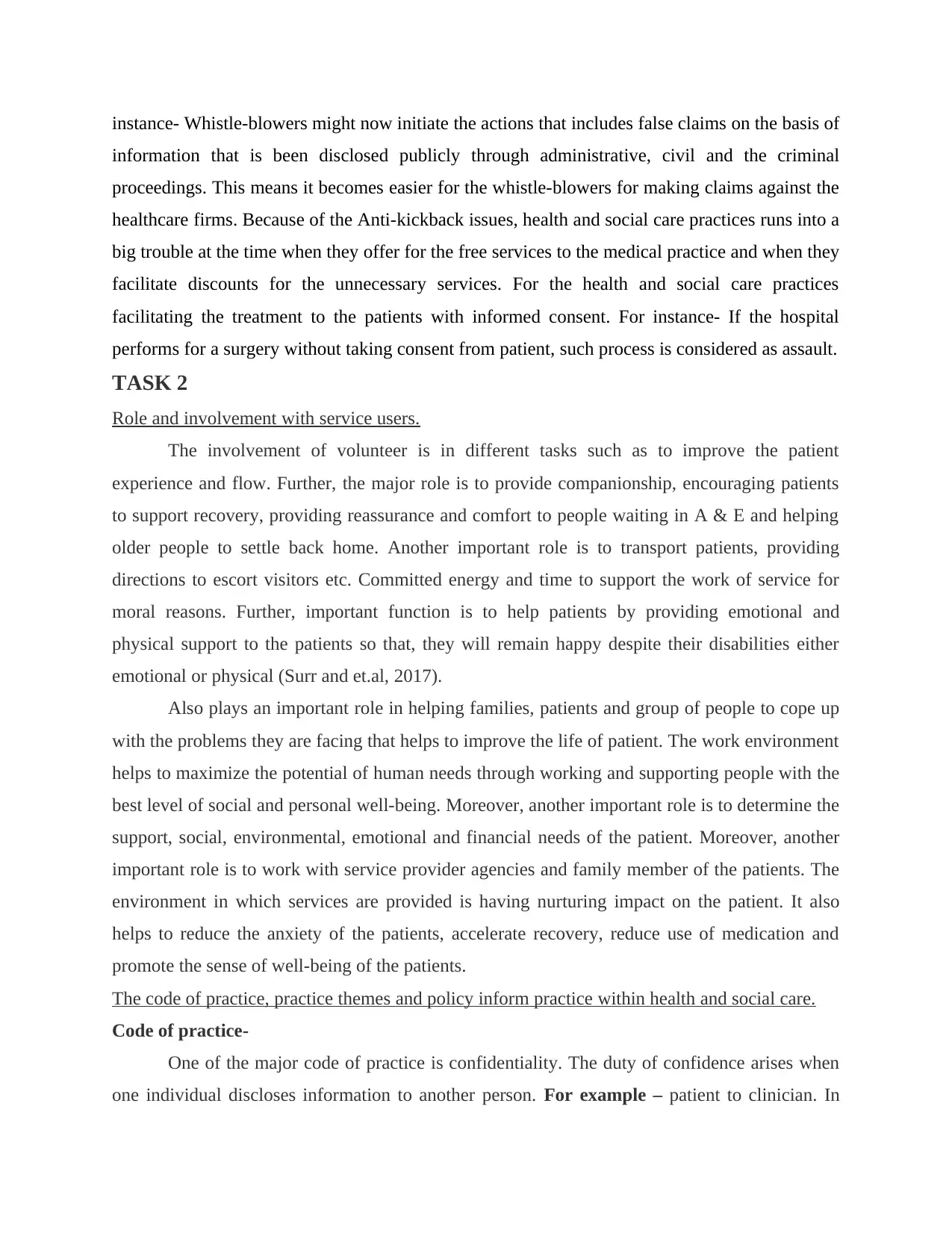
instance- Whistle-blowers might now initiate the actions that includes false claims on the basis of
information that is been disclosed publicly through administrative, civil and the criminal
proceedings. This means it becomes easier for the whistle-blowers for making claims against the
healthcare firms. Because of the Anti-kickback issues, health and social care practices runs into a
big trouble at the time when they offer for the free services to the medical practice and when they
facilitate discounts for the unnecessary services. For the health and social care practices
facilitating the treatment to the patients with informed consent. For instance- If the hospital
performs for a surgery without taking consent from patient, such process is considered as assault.
TASK 2
Role and involvement with service users.
The involvement of volunteer is in different tasks such as to improve the patient
experience and flow. Further, the major role is to provide companionship, encouraging patients
to support recovery, providing reassurance and comfort to people waiting in A & E and helping
older people to settle back home. Another important role is to transport patients, providing
directions to escort visitors etc. Committed energy and time to support the work of service for
moral reasons. Further, important function is to help patients by providing emotional and
physical support to the patients so that, they will remain happy despite their disabilities either
emotional or physical (Surr and et.al, 2017).
Also plays an important role in helping families, patients and group of people to cope up
with the problems they are facing that helps to improve the life of patient. The work environment
helps to maximize the potential of human needs through working and supporting people with the
best level of social and personal well-being. Moreover, another important role is to determine the
support, social, environmental, emotional and financial needs of the patient. Moreover, another
important role is to work with service provider agencies and family member of the patients. The
environment in which services are provided is having nurturing impact on the patient. It also
helps to reduce the anxiety of the patients, accelerate recovery, reduce use of medication and
promote the sense of well-being of the patients.
The code of practice, practice themes and policy inform practice within health and social care.
Code of practice-
One of the major code of practice is confidentiality. The duty of confidence arises when
one individual discloses information to another person. For example – patient to clinician. In
information that is been disclosed publicly through administrative, civil and the criminal
proceedings. This means it becomes easier for the whistle-blowers for making claims against the
healthcare firms. Because of the Anti-kickback issues, health and social care practices runs into a
big trouble at the time when they offer for the free services to the medical practice and when they
facilitate discounts for the unnecessary services. For the health and social care practices
facilitating the treatment to the patients with informed consent. For instance- If the hospital
performs for a surgery without taking consent from patient, such process is considered as assault.
TASK 2
Role and involvement with service users.
The involvement of volunteer is in different tasks such as to improve the patient
experience and flow. Further, the major role is to provide companionship, encouraging patients
to support recovery, providing reassurance and comfort to people waiting in A & E and helping
older people to settle back home. Another important role is to transport patients, providing
directions to escort visitors etc. Committed energy and time to support the work of service for
moral reasons. Further, important function is to help patients by providing emotional and
physical support to the patients so that, they will remain happy despite their disabilities either
emotional or physical (Surr and et.al, 2017).
Also plays an important role in helping families, patients and group of people to cope up
with the problems they are facing that helps to improve the life of patient. The work environment
helps to maximize the potential of human needs through working and supporting people with the
best level of social and personal well-being. Moreover, another important role is to determine the
support, social, environmental, emotional and financial needs of the patient. Moreover, another
important role is to work with service provider agencies and family member of the patients. The
environment in which services are provided is having nurturing impact on the patient. It also
helps to reduce the anxiety of the patients, accelerate recovery, reduce use of medication and
promote the sense of well-being of the patients.
The code of practice, practice themes and policy inform practice within health and social care.
Code of practice-
One of the major code of practice is confidentiality. The duty of confidence arises when
one individual discloses information to another person. For example – patient to clinician. In
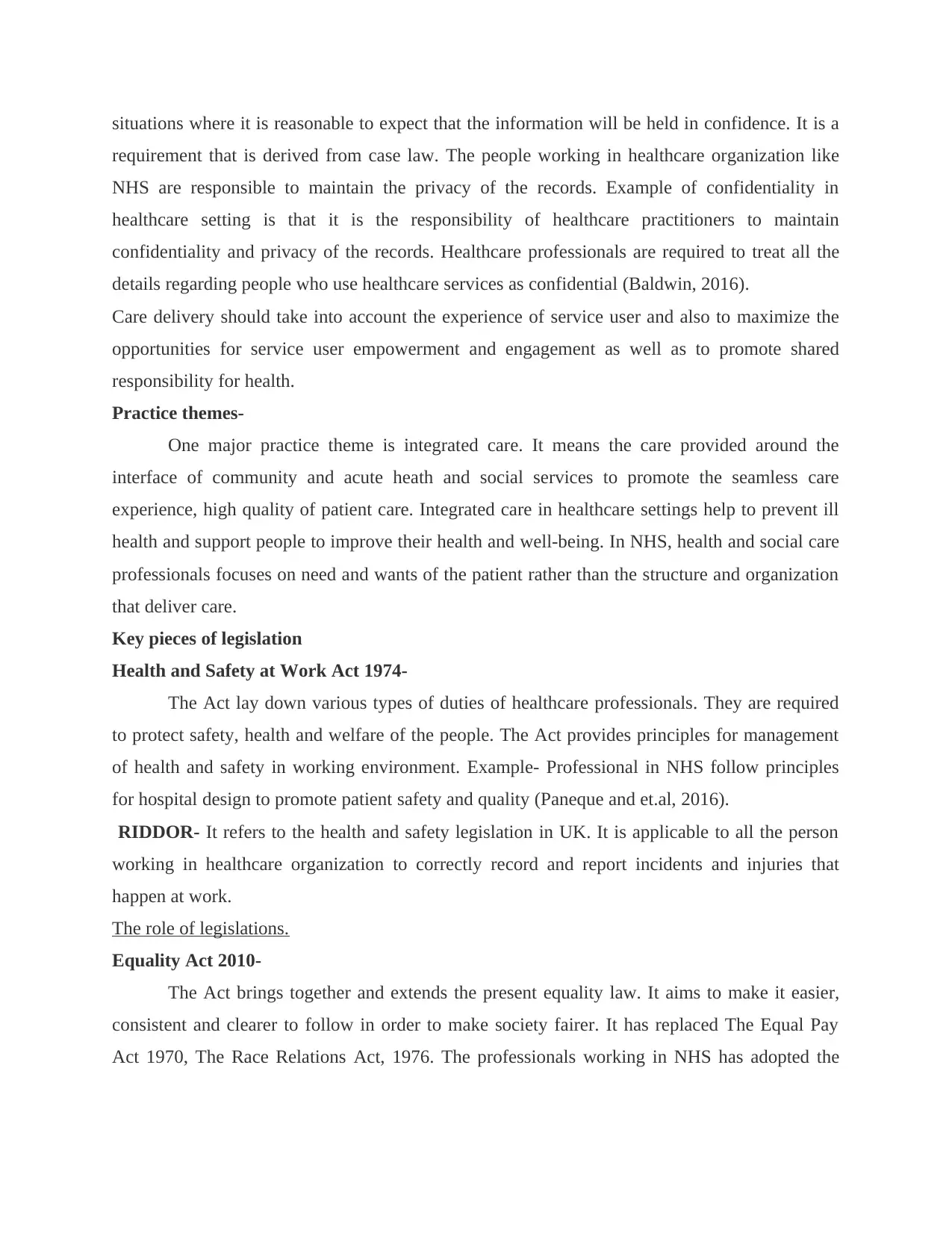
situations where it is reasonable to expect that the information will be held in confidence. It is a
requirement that is derived from case law. The people working in healthcare organization like
NHS are responsible to maintain the privacy of the records. Example of confidentiality in
healthcare setting is that it is the responsibility of healthcare practitioners to maintain
confidentiality and privacy of the records. Healthcare professionals are required to treat all the
details regarding people who use healthcare services as confidential (Baldwin, 2016).
Care delivery should take into account the experience of service user and also to maximize the
opportunities for service user empowerment and engagement as well as to promote shared
responsibility for health.
Practice themes-
One major practice theme is integrated care. It means the care provided around the
interface of community and acute heath and social services to promote the seamless care
experience, high quality of patient care. Integrated care in healthcare settings help to prevent ill
health and support people to improve their health and well-being. In NHS, health and social care
professionals focuses on need and wants of the patient rather than the structure and organization
that deliver care.
Key pieces of legislation
Health and Safety at Work Act 1974-
The Act lay down various types of duties of healthcare professionals. They are required
to protect safety, health and welfare of the people. The Act provides principles for management
of health and safety in working environment. Example- Professional in NHS follow principles
for hospital design to promote patient safety and quality (Paneque and et.al, 2016).
RIDDOR- It refers to the health and safety legislation in UK. It is applicable to all the person
working in healthcare organization to correctly record and report incidents and injuries that
happen at work.
The role of legislations.
Equality Act 2010-
The Act brings together and extends the present equality law. It aims to make it easier,
consistent and clearer to follow in order to make society fairer. It has replaced The Equal Pay
Act 1970, The Race Relations Act, 1976. The professionals working in NHS has adopted the
requirement that is derived from case law. The people working in healthcare organization like
NHS are responsible to maintain the privacy of the records. Example of confidentiality in
healthcare setting is that it is the responsibility of healthcare practitioners to maintain
confidentiality and privacy of the records. Healthcare professionals are required to treat all the
details regarding people who use healthcare services as confidential (Baldwin, 2016).
Care delivery should take into account the experience of service user and also to maximize the
opportunities for service user empowerment and engagement as well as to promote shared
responsibility for health.
Practice themes-
One major practice theme is integrated care. It means the care provided around the
interface of community and acute heath and social services to promote the seamless care
experience, high quality of patient care. Integrated care in healthcare settings help to prevent ill
health and support people to improve their health and well-being. In NHS, health and social care
professionals focuses on need and wants of the patient rather than the structure and organization
that deliver care.
Key pieces of legislation
Health and Safety at Work Act 1974-
The Act lay down various types of duties of healthcare professionals. They are required
to protect safety, health and welfare of the people. The Act provides principles for management
of health and safety in working environment. Example- Professional in NHS follow principles
for hospital design to promote patient safety and quality (Paneque and et.al, 2016).
RIDDOR- It refers to the health and safety legislation in UK. It is applicable to all the person
working in healthcare organization to correctly record and report incidents and injuries that
happen at work.
The role of legislations.
Equality Act 2010-
The Act brings together and extends the present equality law. It aims to make it easier,
consistent and clearer to follow in order to make society fairer. It has replaced The Equal Pay
Act 1970, The Race Relations Act, 1976. The professionals working in NHS has adopted the
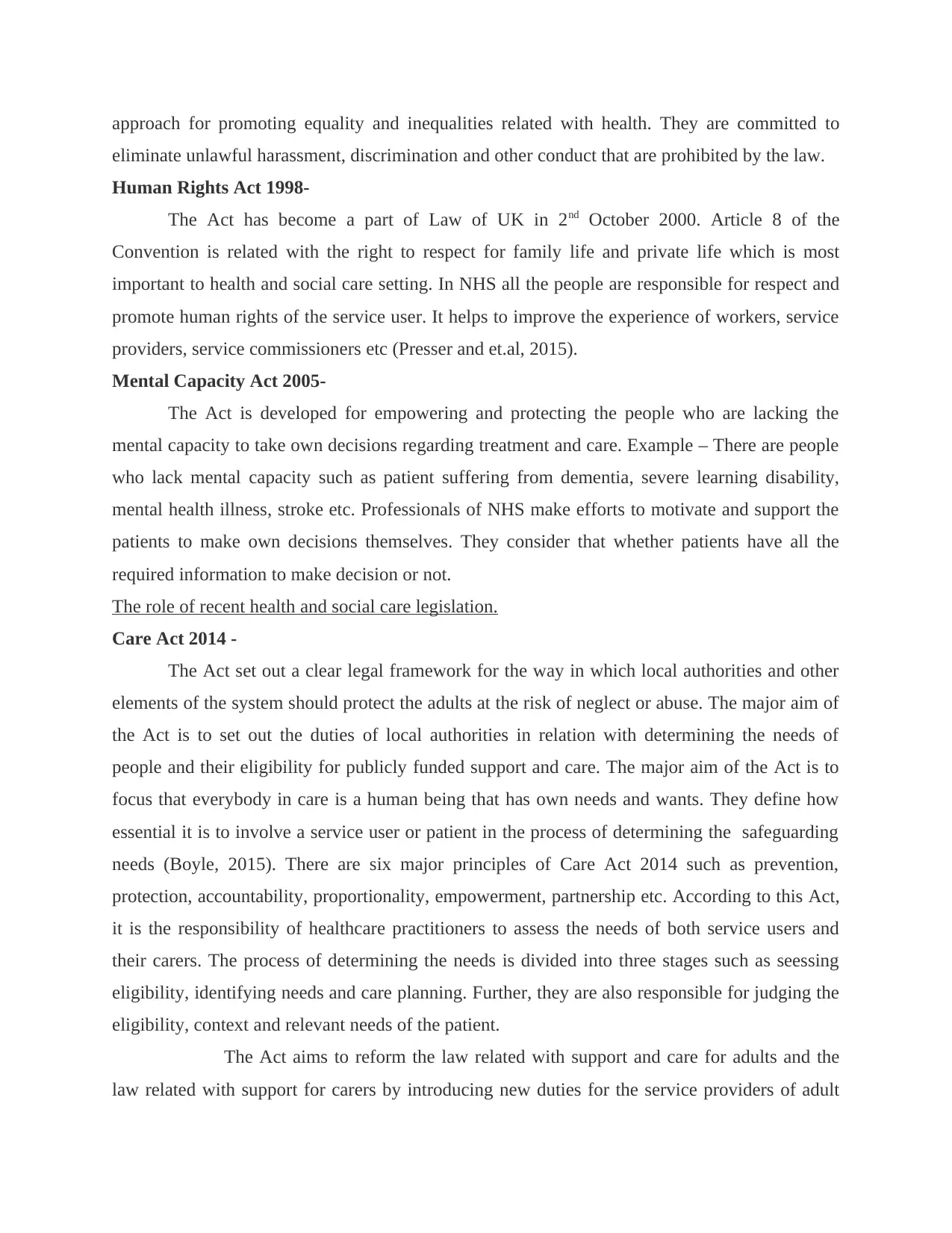
approach for promoting equality and inequalities related with health. They are committed to
eliminate unlawful harassment, discrimination and other conduct that are prohibited by the law.
Human Rights Act 1998-
The Act has become a part of Law of UK in 2nd October 2000. Article 8 of the
Convention is related with the right to respect for family life and private life which is most
important to health and social care setting. In NHS all the people are responsible for respect and
promote human rights of the service user. It helps to improve the experience of workers, service
providers, service commissioners etc (Presser and et.al, 2015).
Mental Capacity Act 2005-
The Act is developed for empowering and protecting the people who are lacking the
mental capacity to take own decisions regarding treatment and care. Example – There are people
who lack mental capacity such as patient suffering from dementia, severe learning disability,
mental health illness, stroke etc. Professionals of NHS make efforts to motivate and support the
patients to make own decisions themselves. They consider that whether patients have all the
required information to make decision or not.
The role of recent health and social care legislation.
Care Act 2014 -
The Act set out a clear legal framework for the way in which local authorities and other
elements of the system should protect the adults at the risk of neglect or abuse. The major aim of
the Act is to set out the duties of local authorities in relation with determining the needs of
people and their eligibility for publicly funded support and care. The major aim of the Act is to
focus that everybody in care is a human being that has own needs and wants. They define how
essential it is to involve a service user or patient in the process of determining the safeguarding
needs (Boyle, 2015). There are six major principles of Care Act 2014 such as prevention,
protection, accountability, proportionality, empowerment, partnership etc. According to this Act,
it is the responsibility of healthcare practitioners to assess the needs of both service users and
their carers. The process of determining the needs is divided into three stages such as seessing
eligibility, identifying needs and care planning. Further, they are also responsible for judging the
eligibility, context and relevant needs of the patient.
The Act aims to reform the law related with support and care for adults and the
law related with support for carers by introducing new duties for the service providers of adult
eliminate unlawful harassment, discrimination and other conduct that are prohibited by the law.
Human Rights Act 1998-
The Act has become a part of Law of UK in 2nd October 2000. Article 8 of the
Convention is related with the right to respect for family life and private life which is most
important to health and social care setting. In NHS all the people are responsible for respect and
promote human rights of the service user. It helps to improve the experience of workers, service
providers, service commissioners etc (Presser and et.al, 2015).
Mental Capacity Act 2005-
The Act is developed for empowering and protecting the people who are lacking the
mental capacity to take own decisions regarding treatment and care. Example – There are people
who lack mental capacity such as patient suffering from dementia, severe learning disability,
mental health illness, stroke etc. Professionals of NHS make efforts to motivate and support the
patients to make own decisions themselves. They consider that whether patients have all the
required information to make decision or not.
The role of recent health and social care legislation.
Care Act 2014 -
The Act set out a clear legal framework for the way in which local authorities and other
elements of the system should protect the adults at the risk of neglect or abuse. The major aim of
the Act is to set out the duties of local authorities in relation with determining the needs of
people and their eligibility for publicly funded support and care. The major aim of the Act is to
focus that everybody in care is a human being that has own needs and wants. They define how
essential it is to involve a service user or patient in the process of determining the safeguarding
needs (Boyle, 2015). There are six major principles of Care Act 2014 such as prevention,
protection, accountability, proportionality, empowerment, partnership etc. According to this Act,
it is the responsibility of healthcare practitioners to assess the needs of both service users and
their carers. The process of determining the needs is divided into three stages such as seessing
eligibility, identifying needs and care planning. Further, they are also responsible for judging the
eligibility, context and relevant needs of the patient.
The Act aims to reform the law related with support and care for adults and the
law related with support for carers by introducing new duties for the service providers of adult
Paraphrase This Document
Need a fresh take? Get an instant paraphrase of this document with our AI Paraphraser
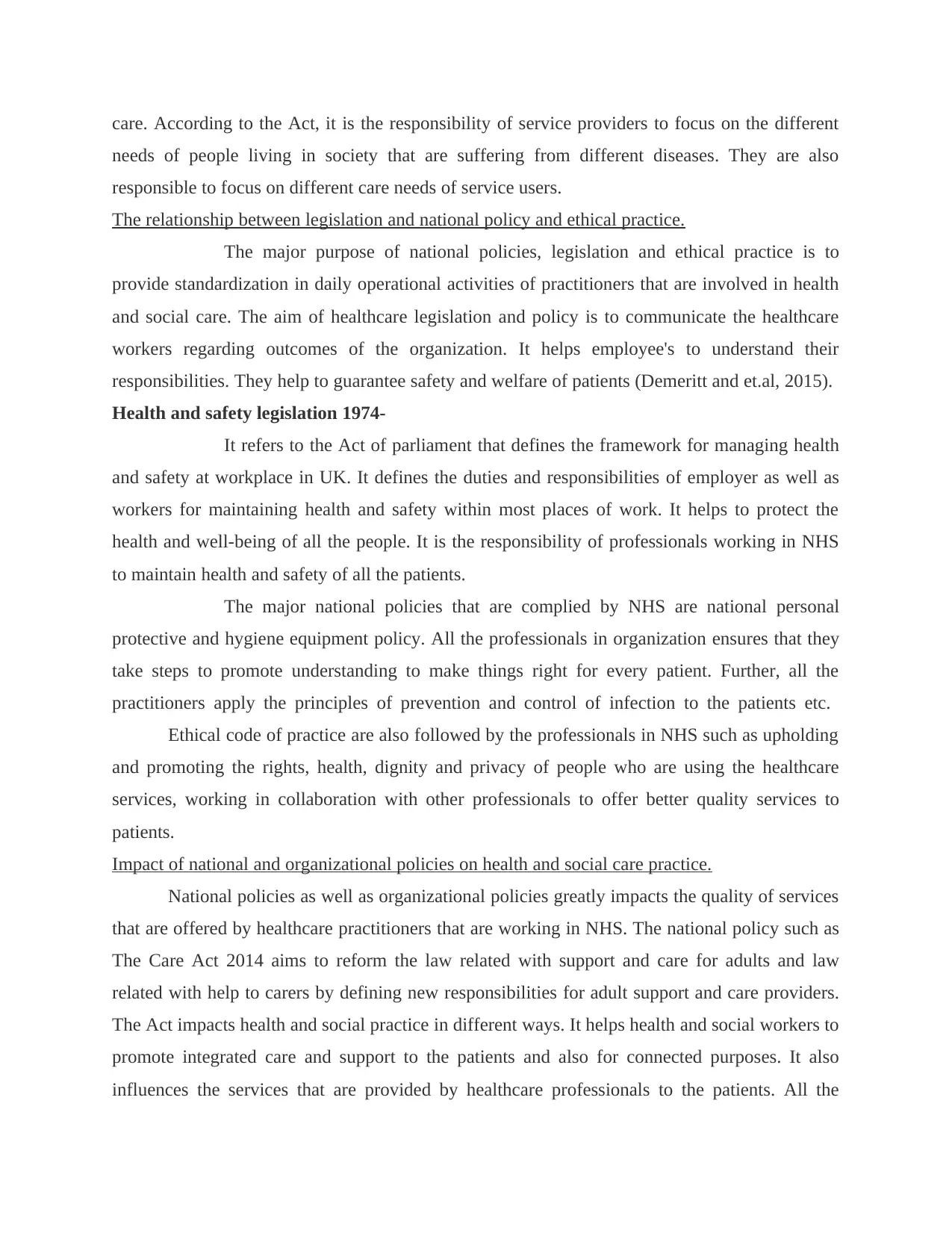
care. According to the Act, it is the responsibility of service providers to focus on the different
needs of people living in society that are suffering from different diseases. They are also
responsible to focus on different care needs of service users.
The relationship between legislation and national policy and ethical practice.
The major purpose of national policies, legislation and ethical practice is to
provide standardization in daily operational activities of practitioners that are involved in health
and social care. The aim of healthcare legislation and policy is to communicate the healthcare
workers regarding outcomes of the organization. It helps employee's to understand their
responsibilities. They help to guarantee safety and welfare of patients (Demeritt and et.al, 2015).
Health and safety legislation 1974-
It refers to the Act of parliament that defines the framework for managing health
and safety at workplace in UK. It defines the duties and responsibilities of employer as well as
workers for maintaining health and safety within most places of work. It helps to protect the
health and well-being of all the people. It is the responsibility of professionals working in NHS
to maintain health and safety of all the patients.
The major national policies that are complied by NHS are national personal
protective and hygiene equipment policy. All the professionals in organization ensures that they
take steps to promote understanding to make things right for every patient. Further, all the
practitioners apply the principles of prevention and control of infection to the patients etc.
Ethical code of practice are also followed by the professionals in NHS such as upholding
and promoting the rights, health, dignity and privacy of people who are using the healthcare
services, working in collaboration with other professionals to offer better quality services to
patients.
Impact of national and organizational policies on health and social care practice.
National policies as well as organizational policies greatly impacts the quality of services
that are offered by healthcare practitioners that are working in NHS. The national policy such as
The Care Act 2014 aims to reform the law related with support and care for adults and law
related with help to carers by defining new responsibilities for adult support and care providers.
The Act impacts health and social practice in different ways. It helps health and social workers to
promote integrated care and support to the patients and also for connected purposes. It also
influences the services that are provided by healthcare professionals to the patients. All the
needs of people living in society that are suffering from different diseases. They are also
responsible to focus on different care needs of service users.
The relationship between legislation and national policy and ethical practice.
The major purpose of national policies, legislation and ethical practice is to
provide standardization in daily operational activities of practitioners that are involved in health
and social care. The aim of healthcare legislation and policy is to communicate the healthcare
workers regarding outcomes of the organization. It helps employee's to understand their
responsibilities. They help to guarantee safety and welfare of patients (Demeritt and et.al, 2015).
Health and safety legislation 1974-
It refers to the Act of parliament that defines the framework for managing health
and safety at workplace in UK. It defines the duties and responsibilities of employer as well as
workers for maintaining health and safety within most places of work. It helps to protect the
health and well-being of all the people. It is the responsibility of professionals working in NHS
to maintain health and safety of all the patients.
The major national policies that are complied by NHS are national personal
protective and hygiene equipment policy. All the professionals in organization ensures that they
take steps to promote understanding to make things right for every patient. Further, all the
practitioners apply the principles of prevention and control of infection to the patients etc.
Ethical code of practice are also followed by the professionals in NHS such as upholding
and promoting the rights, health, dignity and privacy of people who are using the healthcare
services, working in collaboration with other professionals to offer better quality services to
patients.
Impact of national and organizational policies on health and social care practice.
National policies as well as organizational policies greatly impacts the quality of services
that are offered by healthcare practitioners that are working in NHS. The national policy such as
The Care Act 2014 aims to reform the law related with support and care for adults and law
related with help to carers by defining new responsibilities for adult support and care providers.
The Act impacts health and social practice in different ways. It helps health and social workers to
promote integrated care and support to the patients and also for connected purposes. It also
influences the services that are provided by healthcare professionals to the patients. All the
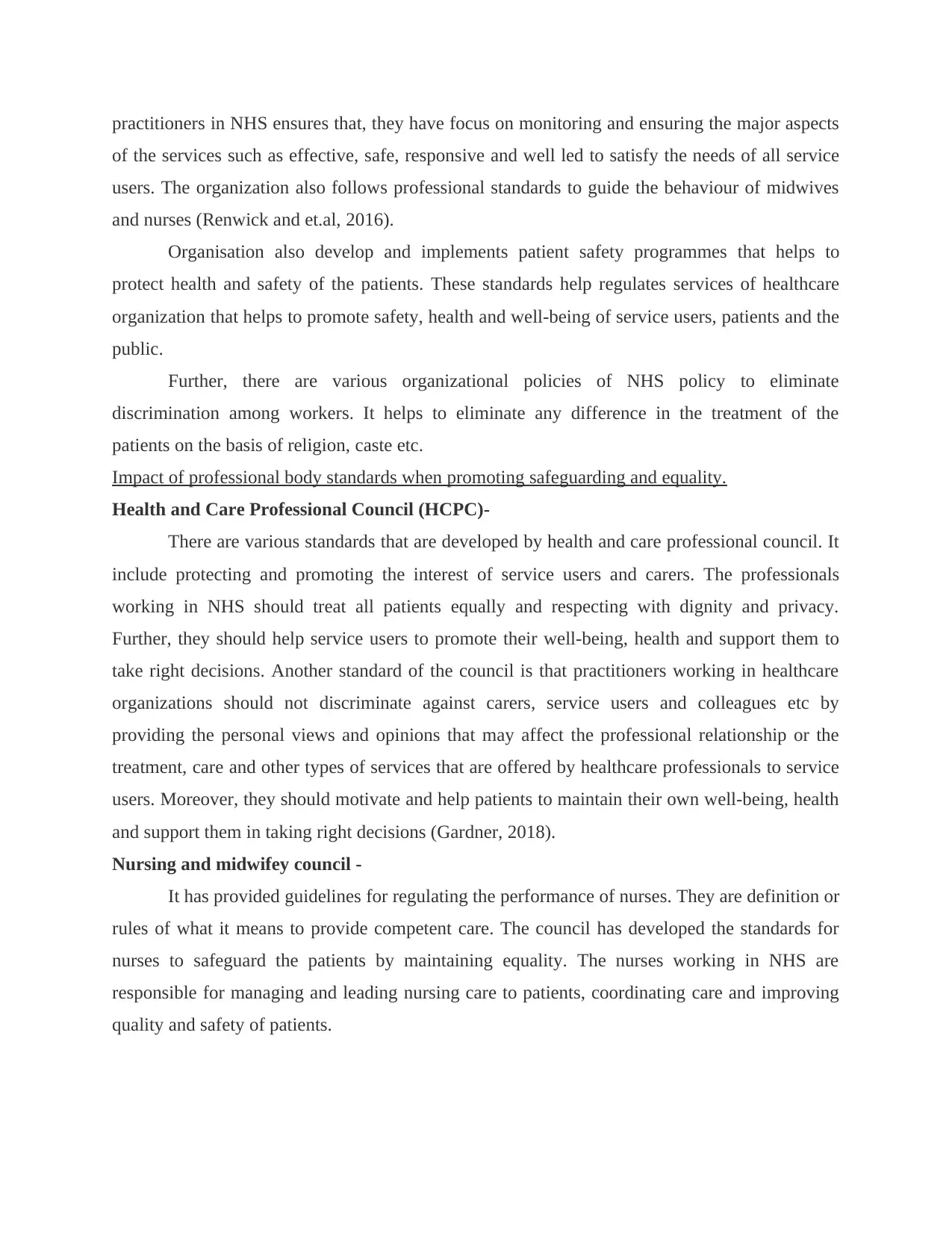
practitioners in NHS ensures that, they have focus on monitoring and ensuring the major aspects
of the services such as effective, safe, responsive and well led to satisfy the needs of all service
users. The organization also follows professional standards to guide the behaviour of midwives
and nurses (Renwick and et.al, 2016).
Organisation also develop and implements patient safety programmes that helps to
protect health and safety of the patients. These standards help regulates services of healthcare
organization that helps to promote safety, health and well-being of service users, patients and the
public.
Further, there are various organizational policies of NHS policy to eliminate
discrimination among workers. It helps to eliminate any difference in the treatment of the
patients on the basis of religion, caste etc.
Impact of professional body standards when promoting safeguarding and equality.
Health and Care Professional Council (HCPC)-
There are various standards that are developed by health and care professional council. It
include protecting and promoting the interest of service users and carers. The professionals
working in NHS should treat all patients equally and respecting with dignity and privacy.
Further, they should help service users to promote their well-being, health and support them to
take right decisions. Another standard of the council is that practitioners working in healthcare
organizations should not discriminate against carers, service users and colleagues etc by
providing the personal views and opinions that may affect the professional relationship or the
treatment, care and other types of services that are offered by healthcare professionals to service
users. Moreover, they should motivate and help patients to maintain their own well-being, health
and support them in taking right decisions (Gardner, 2018).
Nursing and midwifey council -
It has provided guidelines for regulating the performance of nurses. They are definition or
rules of what it means to provide competent care. The council has developed the standards for
nurses to safeguard the patients by maintaining equality. The nurses working in NHS are
responsible for managing and leading nursing care to patients, coordinating care and improving
quality and safety of patients.
of the services such as effective, safe, responsive and well led to satisfy the needs of all service
users. The organization also follows professional standards to guide the behaviour of midwives
and nurses (Renwick and et.al, 2016).
Organisation also develop and implements patient safety programmes that helps to
protect health and safety of the patients. These standards help regulates services of healthcare
organization that helps to promote safety, health and well-being of service users, patients and the
public.
Further, there are various organizational policies of NHS policy to eliminate
discrimination among workers. It helps to eliminate any difference in the treatment of the
patients on the basis of religion, caste etc.
Impact of professional body standards when promoting safeguarding and equality.
Health and Care Professional Council (HCPC)-
There are various standards that are developed by health and care professional council. It
include protecting and promoting the interest of service users and carers. The professionals
working in NHS should treat all patients equally and respecting with dignity and privacy.
Further, they should help service users to promote their well-being, health and support them to
take right decisions. Another standard of the council is that practitioners working in healthcare
organizations should not discriminate against carers, service users and colleagues etc by
providing the personal views and opinions that may affect the professional relationship or the
treatment, care and other types of services that are offered by healthcare professionals to service
users. Moreover, they should motivate and help patients to maintain their own well-being, health
and support them in taking right decisions (Gardner, 2018).
Nursing and midwifey council -
It has provided guidelines for regulating the performance of nurses. They are definition or
rules of what it means to provide competent care. The council has developed the standards for
nurses to safeguard the patients by maintaining equality. The nurses working in NHS are
responsible for managing and leading nursing care to patients, coordinating care and improving
quality and safety of patients.
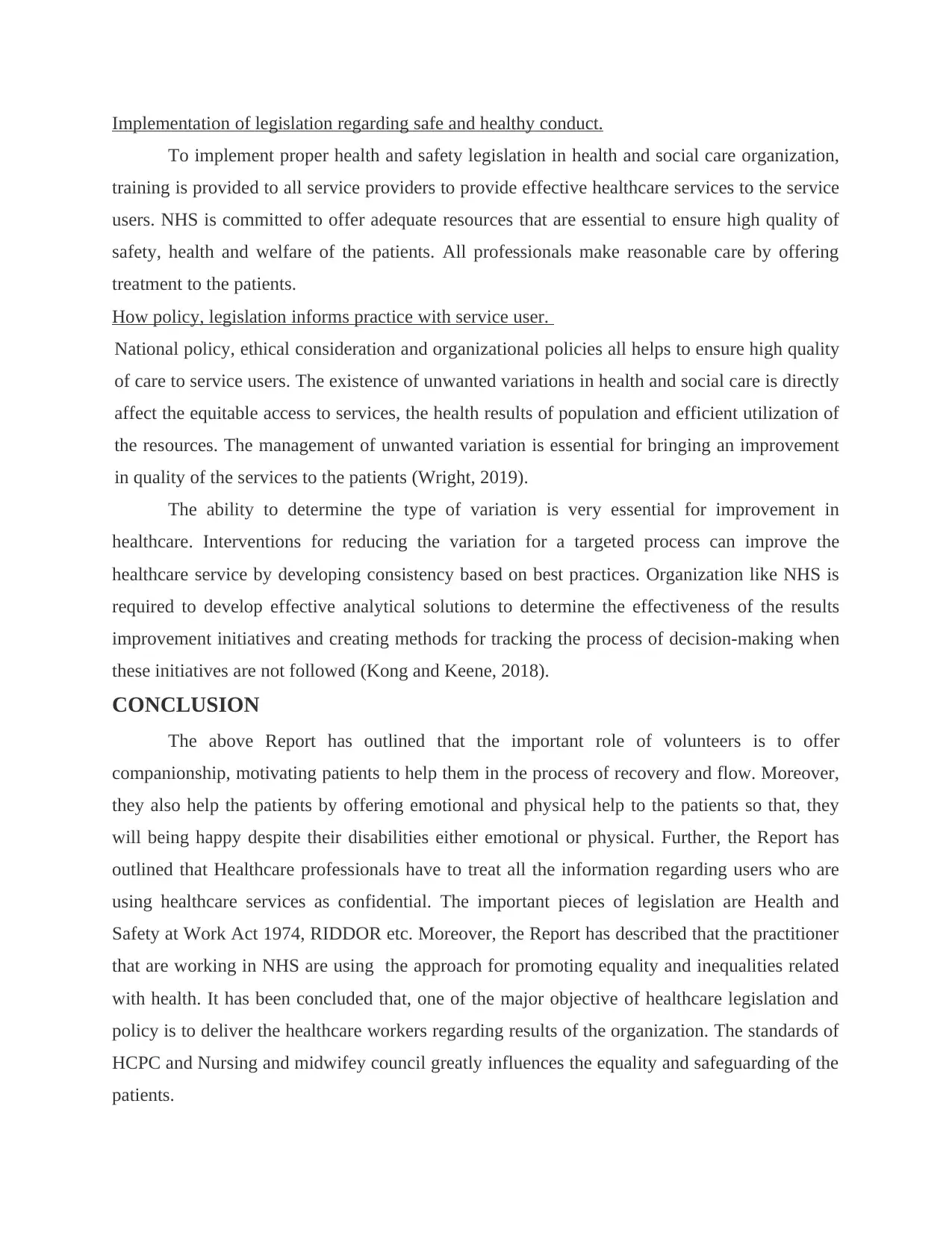
Implementation of legislation regarding safe and healthy conduct.
To implement proper health and safety legislation in health and social care organization,
training is provided to all service providers to provide effective healthcare services to the service
users. NHS is committed to offer adequate resources that are essential to ensure high quality of
safety, health and welfare of the patients. All professionals make reasonable care by offering
treatment to the patients.
How policy, legislation informs practice with service user.
National policy, ethical consideration and organizational policies all helps to ensure high quality
of care to service users. The existence of unwanted variations in health and social care is directly
affect the equitable access to services, the health results of population and efficient utilization of
the resources. The management of unwanted variation is essential for bringing an improvement
in quality of the services to the patients (Wright, 2019).
The ability to determine the type of variation is very essential for improvement in
healthcare. Interventions for reducing the variation for a targeted process can improve the
healthcare service by developing consistency based on best practices. Organization like NHS is
required to develop effective analytical solutions to determine the effectiveness of the results
improvement initiatives and creating methods for tracking the process of decision-making when
these initiatives are not followed (Kong and Keene, 2018).
CONCLUSION
The above Report has outlined that the important role of volunteers is to offer
companionship, motivating patients to help them in the process of recovery and flow. Moreover,
they also help the patients by offering emotional and physical help to the patients so that, they
will being happy despite their disabilities either emotional or physical. Further, the Report has
outlined that Healthcare professionals have to treat all the information regarding users who are
using healthcare services as confidential. The important pieces of legislation are Health and
Safety at Work Act 1974, RIDDOR etc. Moreover, the Report has described that the practitioner
that are working in NHS are using the approach for promoting equality and inequalities related
with health. It has been concluded that, one of the major objective of healthcare legislation and
policy is to deliver the healthcare workers regarding results of the organization. The standards of
HCPC and Nursing and midwifey council greatly influences the equality and safeguarding of the
patients.
To implement proper health and safety legislation in health and social care organization,
training is provided to all service providers to provide effective healthcare services to the service
users. NHS is committed to offer adequate resources that are essential to ensure high quality of
safety, health and welfare of the patients. All professionals make reasonable care by offering
treatment to the patients.
How policy, legislation informs practice with service user.
National policy, ethical consideration and organizational policies all helps to ensure high quality
of care to service users. The existence of unwanted variations in health and social care is directly
affect the equitable access to services, the health results of population and efficient utilization of
the resources. The management of unwanted variation is essential for bringing an improvement
in quality of the services to the patients (Wright, 2019).
The ability to determine the type of variation is very essential for improvement in
healthcare. Interventions for reducing the variation for a targeted process can improve the
healthcare service by developing consistency based on best practices. Organization like NHS is
required to develop effective analytical solutions to determine the effectiveness of the results
improvement initiatives and creating methods for tracking the process of decision-making when
these initiatives are not followed (Kong and Keene, 2018).
CONCLUSION
The above Report has outlined that the important role of volunteers is to offer
companionship, motivating patients to help them in the process of recovery and flow. Moreover,
they also help the patients by offering emotional and physical help to the patients so that, they
will being happy despite their disabilities either emotional or physical. Further, the Report has
outlined that Healthcare professionals have to treat all the information regarding users who are
using healthcare services as confidential. The important pieces of legislation are Health and
Safety at Work Act 1974, RIDDOR etc. Moreover, the Report has described that the practitioner
that are working in NHS are using the approach for promoting equality and inequalities related
with health. It has been concluded that, one of the major objective of healthcare legislation and
policy is to deliver the healthcare workers regarding results of the organization. The standards of
HCPC and Nursing and midwifey council greatly influences the equality and safeguarding of the
patients.
Secure Best Marks with AI Grader
Need help grading? Try our AI Grader for instant feedback on your assignments.
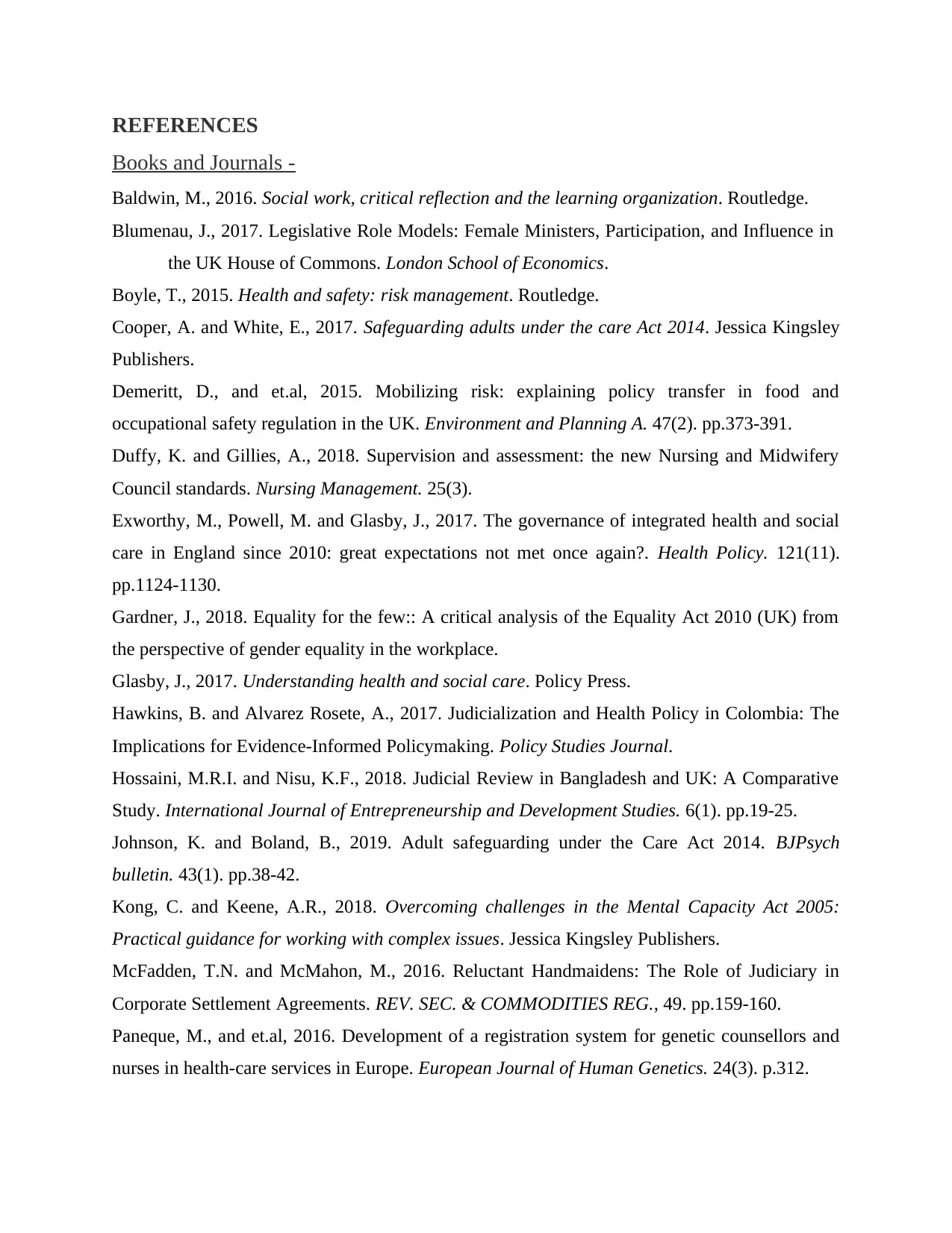
REFERENCES
Books and Journals -
Baldwin, M., 2016. Social work, critical reflection and the learning organization. Routledge.
Blumenau, J., 2017. Legislative Role Models: Female Ministers, Participation, and Influence in
the UK House of Commons. London School of Economics.
Boyle, T., 2015. Health and safety: risk management. Routledge.
Cooper, A. and White, E., 2017. Safeguarding adults under the care Act 2014. Jessica Kingsley
Publishers.
Demeritt, D., and et.al, 2015. Mobilizing risk: explaining policy transfer in food and
occupational safety regulation in the UK. Environment and Planning A. 47(2). pp.373-391.
Duffy, K. and Gillies, A., 2018. Supervision and assessment: the new Nursing and Midwifery
Council standards. Nursing Management. 25(3).
Exworthy, M., Powell, M. and Glasby, J., 2017. The governance of integrated health and social
care in England since 2010: great expectations not met once again?. Health Policy. 121(11).
pp.1124-1130.
Gardner, J., 2018. Equality for the few:: A critical analysis of the Equality Act 2010 (UK) from
the perspective of gender equality in the workplace.
Glasby, J., 2017. Understanding health and social care. Policy Press.
Hawkins, B. and Alvarez Rosete, A., 2017. Judicialization and Health Policy in Colombia: The
Implications for Evidence‐Informed Policymaking. Policy Studies Journal.
Hossaini, M.R.I. and Nisu, K.F., 2018. Judicial Review in Bangladesh and UK: A Comparative
Study. International Journal of Entrepreneurship and Development Studies. 6(1). pp.19-25.
Johnson, K. and Boland, B., 2019. Adult safeguarding under the Care Act 2014. BJPsych
bulletin. 43(1). pp.38-42.
Kong, C. and Keene, A.R., 2018. Overcoming challenges in the Mental Capacity Act 2005:
Practical guidance for working with complex issues. Jessica Kingsley Publishers.
McFadden, T.N. and McMahon, M., 2016. Reluctant Handmaidens: The Role of Judiciary in
Corporate Settlement Agreements. REV. SEC. & COMMODITIES REG., 49. pp.159-160.
Paneque, M., and et.al, 2016. Development of a registration system for genetic counsellors and
nurses in health-care services in Europe. European Journal of Human Genetics. 24(3). p.312.
Books and Journals -
Baldwin, M., 2016. Social work, critical reflection and the learning organization. Routledge.
Blumenau, J., 2017. Legislative Role Models: Female Ministers, Participation, and Influence in
the UK House of Commons. London School of Economics.
Boyle, T., 2015. Health and safety: risk management. Routledge.
Cooper, A. and White, E., 2017. Safeguarding adults under the care Act 2014. Jessica Kingsley
Publishers.
Demeritt, D., and et.al, 2015. Mobilizing risk: explaining policy transfer in food and
occupational safety regulation in the UK. Environment and Planning A. 47(2). pp.373-391.
Duffy, K. and Gillies, A., 2018. Supervision and assessment: the new Nursing and Midwifery
Council standards. Nursing Management. 25(3).
Exworthy, M., Powell, M. and Glasby, J., 2017. The governance of integrated health and social
care in England since 2010: great expectations not met once again?. Health Policy. 121(11).
pp.1124-1130.
Gardner, J., 2018. Equality for the few:: A critical analysis of the Equality Act 2010 (UK) from
the perspective of gender equality in the workplace.
Glasby, J., 2017. Understanding health and social care. Policy Press.
Hawkins, B. and Alvarez Rosete, A., 2017. Judicialization and Health Policy in Colombia: The
Implications for Evidence‐Informed Policymaking. Policy Studies Journal.
Hossaini, M.R.I. and Nisu, K.F., 2018. Judicial Review in Bangladesh and UK: A Comparative
Study. International Journal of Entrepreneurship and Development Studies. 6(1). pp.19-25.
Johnson, K. and Boland, B., 2019. Adult safeguarding under the Care Act 2014. BJPsych
bulletin. 43(1). pp.38-42.
Kong, C. and Keene, A.R., 2018. Overcoming challenges in the Mental Capacity Act 2005:
Practical guidance for working with complex issues. Jessica Kingsley Publishers.
McFadden, T.N. and McMahon, M., 2016. Reluctant Handmaidens: The Role of Judiciary in
Corporate Settlement Agreements. REV. SEC. & COMMODITIES REG., 49. pp.159-160.
Paneque, M., and et.al, 2016. Development of a registration system for genetic counsellors and
nurses in health-care services in Europe. European Journal of Human Genetics. 24(3). p.312.
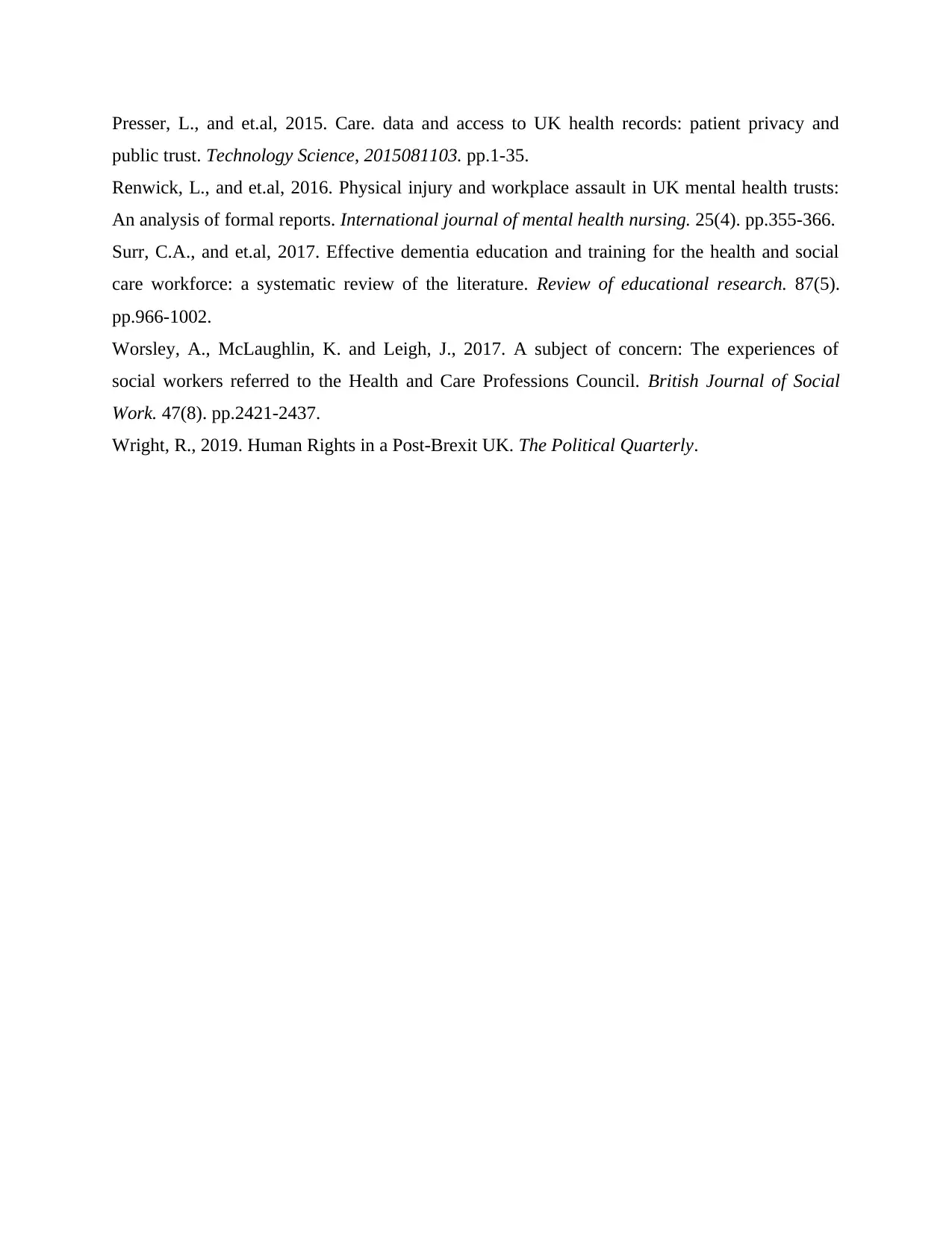
Presser, L., and et.al, 2015. Care. data and access to UK health records: patient privacy and
public trust. Technology Science, 2015081103. pp.1-35.
Renwick, L., and et.al, 2016. Physical injury and workplace assault in UK mental health trusts:
An analysis of formal reports. International journal of mental health nursing. 25(4). pp.355-366.
Surr, C.A., and et.al, 2017. Effective dementia education and training for the health and social
care workforce: a systematic review of the literature. Review of educational research. 87(5).
pp.966-1002.
Worsley, A., McLaughlin, K. and Leigh, J., 2017. A subject of concern: The experiences of
social workers referred to the Health and Care Professions Council. British Journal of Social
Work. 47(8). pp.2421-2437.
Wright, R., 2019. Human Rights in a Post‐Brexit UK. The Political Quarterly.
public trust. Technology Science, 2015081103. pp.1-35.
Renwick, L., and et.al, 2016. Physical injury and workplace assault in UK mental health trusts:
An analysis of formal reports. International journal of mental health nursing. 25(4). pp.355-366.
Surr, C.A., and et.al, 2017. Effective dementia education and training for the health and social
care workforce: a systematic review of the literature. Review of educational research. 87(5).
pp.966-1002.
Worsley, A., McLaughlin, K. and Leigh, J., 2017. A subject of concern: The experiences of
social workers referred to the Health and Care Professions Council. British Journal of Social
Work. 47(8). pp.2421-2437.
Wright, R., 2019. Human Rights in a Post‐Brexit UK. The Political Quarterly.
1 out of 12
Related Documents
Your All-in-One AI-Powered Toolkit for Academic Success.
+13062052269
info@desklib.com
Available 24*7 on WhatsApp / Email
![[object Object]](/_next/static/media/star-bottom.7253800d.svg)
Unlock your academic potential
© 2024 | Zucol Services PVT LTD | All rights reserved.





